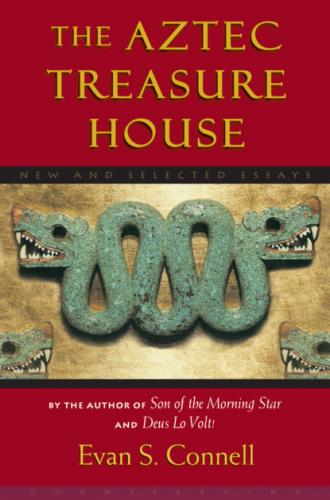ALSO BY EVAN S. CONNELL
The Anatomy Lesson and Other Stories
Mrs. Bridge
The Patriot
Notes from a Bottle Found on the Beach at Carmel
At the Crossroads
The Diary of a Rapist
Mr. Bridge
Points for a Compass Rose
The Connoisseur
Double Honeymoon
A Long Desire
The White Lantern
Saint Augustine’s Pigeon
Son of the Morning Star
The Alchymist’s Journal
Mesa Verde
The Collected Stories of Evan S. Connell
Deus lo Volt!
Copyright © 2001 Evan S. Connell
All rights reserved under international and Pan-American Copyright Conventions. No part of this book may be used or reproduced in any manner whatsoever without written permission from the Publisher, except in the case of brief quotations embodied in critical articles and reviews.
“Messages on a Sandstone Bluff” is reprinted from the July-August 1996 issue of Preservation, the official magazine of the National Trust for Historic Preservation. “Mesa Verde” was originally published in a limited edition by The Library Fellows of the Whitney Museum of American Art, 1992.
LIBRARY OF CONGRESS CATALOGING-IN-PUBLICATION DATA
Connell, Evan S., 1924–
The Aztec treasure house : new and selected essays / Evan S. Connell.
p. cm.
Includes bibliographical references.
I. Title.
PS3553.O5 A97 2001
| 814'.54—dc21 | 2001028899 |
FIRST PAPER BACK PRINTING
Jacket and text design by Amy Evans McClure
COUNTER POINT
387 Park Avenue South
New York, N.Y. 10016-8810
Counterpoint is a member of the Perseus Books Group
10 9 8 7 6 5 4 3 2 1
e-book ISBN 978-1-61902-691-9
TO
JACK SHOEMAKER
CONTENTS
6 • Syllables Here and There
7 • Abracadastra
8 • Various Tourists
9 • The Aztec Treasure House
10 • Aristokles’ Atlantis
11 • The Innocents’ Crusade
12 • Prester John
13 • To the Indies
14 • The Sea Must Have an Endynge
15 • El Dorado
16 • Seven Cities
17 • Gold! Gold! Gold!
18 • Philippus Theophrastus Aureolus Bombastus ab Hohenheim & Co.
19 • Mesa Verde
20 • Messages on a Sandstone Bluff
Bibliography
The soul has many motions, many gods come and go.
D. H. LAWRENCE
JAMES USSHER, BORN IN 1581, attended Trinity College, Dublin, where he was ordained at the age of twenty. Four years later he became chancellor of Saint Patrick’s Cathedral. Ten years after that he drafted the articles of doctrine and discipline for the Irish Protestant Church. At forty he was appointed bishop of Meath. Soon he became archbishop of Armagh. He visited England frequently and after his death he was buried, by Cromwell’s order, in Westminster Abbey. Widely honored and respected, not merely because of his ecclesiastic eminence but for prodigious scholarship, he was the first to distinguish between the genuine and spurious epistles of Saint Ignatius of Antioch. He wrote as fluently in Latin as in English, and among his most celebrated works is Annales Veteris et Novi Tentamenti, a tremendous article of faith which proves that God created the Universe in 4004 B.C.
Considering Archbishop Ussher’s erudition and prestige, nobody should have challenged his date for the Creation, but the devil’s disciples seldom rest. So we come upon Isaac de La Peyrère who, after examining some oddly chipped stones gathered from the French countryside, wrote a little book in which he asserted that these stones had been chipped by human beings who lived before the time of Adam. The year A.D. 1655 was not a good year to make such observations: M. de La Peyrère’s blasphemous monograph was publicly incinerated.
You might think this warning would be sufficient, enabling Christians to sleep comfortably through another millennium; but the Western world had begun to awaken and strict guardians of the status quo could not prevent impertinent questions from blossoming like daffodils in spring.
The Ark, for instance. How big was it? How many animals shuffled up the gangplank?
This problem, although not new, had been complicated by the voyages of Columbus and other explorers who reported seeing strange birds and beasts. In 1559 a monk named Johann Buteo had tried to clear up the matter with a learned disquisition titled Noah’s Ark, its Form and its Capacity. Alas, Brother Buteo’s statement did not assuage certain doubts.
Theologians then explained that these previously unknown creatures came into existence after the Flood just as domestic animals crossbreed and evolve, just as the mating of a cat with a wolf produces a lynx, or a camel with a leopard produces a giraffe.
Sir Walter Raleigh had something to say, as usual. New species might emerge not only through crossbreeding but also because of different surroundings. The European wildcat, when its home is India, grows up to become the panther. The European blackbird changes color and size in Virginia.
Nevertheless, despite every explanation, new and more
